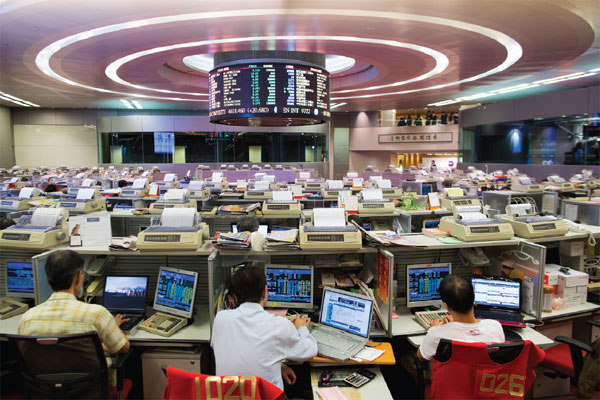Lesson in scandals
Updated: 2015-01-30 14:35
By Luo Weiteng(China Daily USA)
|
||||||||

|
As at the end of 2014, a total of 1,752 companies were listed on the Hong Kong Stock Exchange, half of them mainland firms and accounting for 60.1 percent of the total market capitalization. Jerome Favre / Bloomberg |
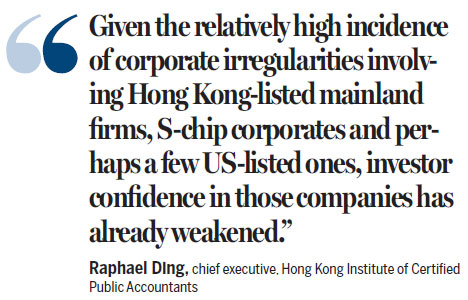
Transparency is key as irregularities involving HK-listed mainland firms make them sitting targets for short sellers. Luo Weiteng reports.
The string of scandals last year involving Hong Kong-listed Chinese mainland firms, including Tianhe Chemicals and sausage-casings maker Shenguan Holdings Group, has fueled concerns about corruption and corporate malfeasance in the world's second-largest economy, as short sellers increasingly target mainland companies, especially smaller ones, with claims of falsified financial statements and other dubious practices.
"Given the relatively high incidence of corporate irregularities involving Hong Kong-listed mainland firms, S-chip corporates (China-based companies listed in Singapore) and perhaps a few US-listed ones, investor confidence in those companies has already weakened," said Raphael Ding, chief executive of the Hong Kong Institute of Certified Public Accountants. "It came as no surprise that foreign short sellers identify them as whole as easy targets."
Bad apples
A vicious spiral can thus be triggered where profit-seeking short sellers tend to target mainland firms, hurting sentiment and sparking a new round of attacks on more mainland companies.
Although problematic mainland companies targeted by short sellers should be a tiny minority of the industry, it does not need many instances to shake investor confidence.
"Actually, one or two high-profile corporate scandals are quite enough to tarnish the reputation of the whole sector," said Ding.
"Recent headline-making corporate scandals just reflect the general sentiment and view of the market that corporate governance (CG) in a great many mainland companies still leaves much to be desired," said Stephen Wong, adjunct associate professor at the Institute for China Business under the University of Hong Kong's School of Professional and Continuing Education (SPACE).
"Ongoing CG issues are the proper incentives for short sellers to short mainland companies."
In its Corporate Governance Watch 2014 report released in September, CLSA highlighted weak audit committees and limited support for CG within 944 surveyed companies across 12 Asia-Pacific markets.
Hong Kong has seen several problematic companies list in recent years - apart from Tianhe and Shenguan, menswear maker Fujian Nuoqi Co and trade center operator Hydoo International both revealed that their chairmen were missing amid media reports that they had run up huge debts - in addition to the numerous corporate scandals that have harmed minority interests.
But despite all that, Hong Kong marginally beat Singapore to have the best CG in Asia this year, while the mainland, with relatively slipping CG standards, saw slight drops in CG rules, accounting and auditing.
The report just goes to show that a good CG structure alone is far from enough to make a difference, observed Ding.
"With the highest requirement of CG in the region, Hong Kong is still unable to stop the wrongdoings," said Ding.
He emphasized that a change of mindset and timely regulatory actions jointly carried out by regulators in the listing destination and home country are a must and should even get priority over a well-developed CG structure.
"After all, problems eventually lie in people rather than in the system itself," he added.
The shift in thinking means city regulators should be realistic that high quality companies do not present themselves every day.
"Companies normally take years to grow from small to big, ready for the listing. You cannot expect to maintain high volume of IPO year after year," said Ding, who is concerned about the obsession with rankings in terms of IPO volume at Hong Kong Exchanges and Clearing Ltd (HKEx).
"So we really have to live with a slowdown in IPO activities and try to accept cyclical new listings rather than continuous ones," he explained.
According to data from HKEx, as at the end of 2014, a total of 1,752 companies were listed on the Hong Kong Main Board - Asia's second-largest - and the Growth Enterprise Market (GEM) board, an alternative stock market. Of these, 876 - or 50 percent - are mainland companies, with 60.1 percent of the total market capitalization.
As at the end of October, HKEx including GEM notched up $3.3 trillion in market capitalization, as the sixth-largest stock exchange in the world behind Euronext and the second-largest in Asia behind the Tokyo Stock Exchange.
Though some of the new listings can be quite revenue-generating, it is quality rather than quantity counts, Ding said, adding that Hong Kong has been taking a huge risk in accepting smaller and marginal companies into its stock market.
Change mindset
Seventy-nine mainland companies listed in Hong Kong in 2014, which culminated with another year-end listing rush, with mega-offerings from mainland-based Dalian Wanda Commercial Properties, the biggest listing in Asia this year when it raised $3.7 billion in December, and a $3.2 billion IPO by nuclear firm CGN Power Co, along with a clutch of smaller mainland candidates.
That burst pushed Hong Kong into second place in the global IPO rankings, behind New York, home to the record Alibaba listing in September. The SAR placed second in 2013 as well, behind New York but ahead of London.
Meanwhile, the conflicting roles of HKEx as both a referee (regulator) and player (revenue-generating listed company) have led to a string of unresolved interest conflicts, which have created fragmentation in devising a coherent regulatory framework, observed Wong at SPACE.
However, Wong does not think it is easy to make institutional changes.
A change of mindset also means the founder and major shareholders must realize that the company is no longer their personal property. They cannot simply transfer money in and out with bankers between Hong Kong and the mainland at will, noted Ding.
"Admittedly, top management have huge powers to affect company operations or to override internal controls. But people who work with or for them, mostly accountants and auditors, should shift their thinking as well," said Patrick Yeung, divisional past president-Greater China at CPA Australia.
The current regulatory framework relies heavily on accountants and auditors, who are therefore required to carry a high degree of alertness, ethical standards and public accountability to help stop scandals from happening, added Yeung.
Expectedly, the city's listing market will embrace more mainland-listed companies in the near future.
"Transparency is the issue. Investors in general are always on the lookout for companies that are honest and can make money for them," said Yeung.
"It is an ongoing process of teaching listed companies to behave properly," added Wong.
Contact the writer at sophia@chinadailyhk.com
(China Daily USA 01/30/2015 page7)

 US futurist touts the rise of the "Global Southern Belt"
US futurist touts the rise of the "Global Southern Belt"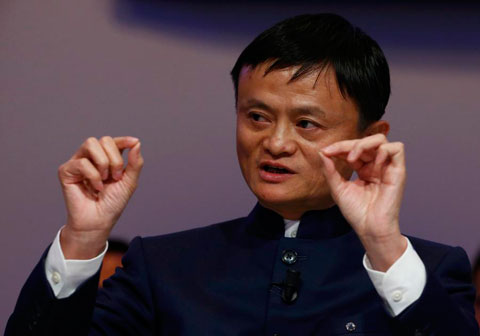
 Ten surprising facts about Jack Ma
Ten surprising facts about Jack Ma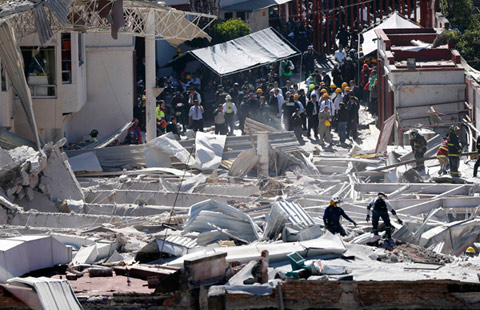
 Gas blast at Mexico City children's hospital kills 7, injures 54
Gas blast at Mexico City children's hospital kills 7, injures 54
 Ten characteristic streets in Beijing
Ten characteristic streets in Beijing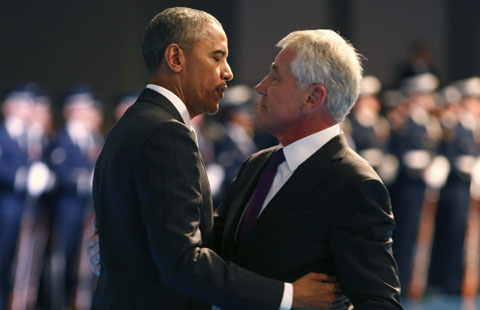
 Outgoing US Defense Secretary Hagel lauded at farewell
Outgoing US Defense Secretary Hagel lauded at farewell
 Don't have to be a queen to live in frozen wild of snow
Don't have to be a queen to live in frozen wild of snow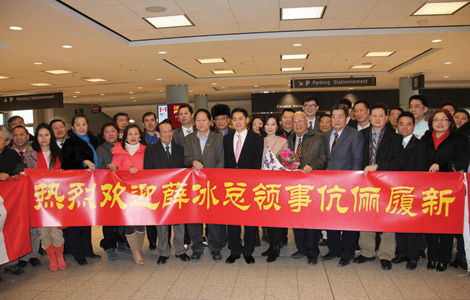
 Across Canada Jan 30
Across Canada Jan 30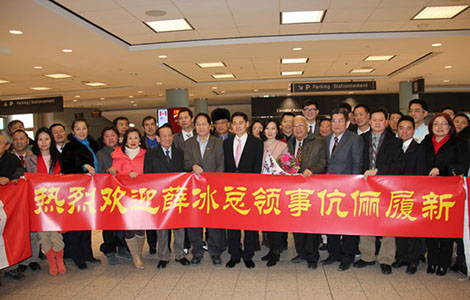
 New consul general greeted
New consul general greeted
Most Viewed
Editor's Picks

|

|

|

|

|

|
Today's Top News
US futurist touts the rise of the "Global Southern Belt"
Chinese brands derive rising revenue proportion overseas
Mongolian culture to highlight New Year's concert
Alibaba quarterly revenue disappoints, shares fall
'Nightmare' incompatible with China-US relations
Alibaba adjusted profit tops estimates, revenue falls short
US ambassador to China calls for Flying Tigers movie
Taobao locks horns with regulator
US Weekly

|

|
